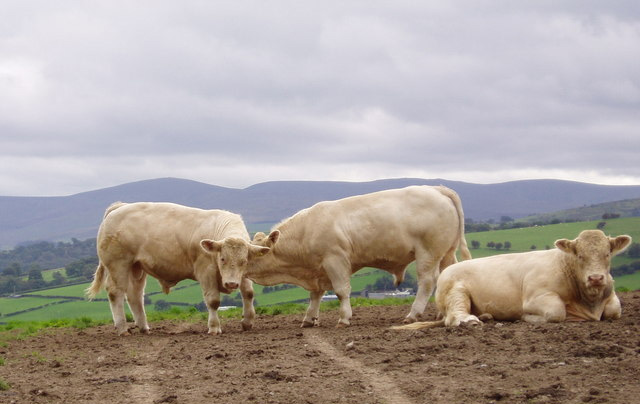
The Scottish Beef Association has warned many upland beef farmers could be "shafted" by the new CAP deal. The association insisted many beef producers are set to lose as much as 50 per cent of their current Single Farm Payment once the reform kicks in.
And they have called on beef producers to use the Scottish Government's ready reckoner to calculate exactly how they will be affected.
The Minister for Natural Resources and Food, Alun Davies announced how millions of pounds worth of European agricultural funding will be shared between farmers in Wales and used to develop the industry.
Chairman Scott Henderson said: "I am hearing some scary reports from SBA members who are set to lose up to 50 per cent - €200 a cow- of their SFP in the new regime.
"There must be hundreds of beef farmers out there who have both PGRS and RGR and many could be impacted by this.
"These active farms are the backbone of the Scottish beef herd and it is vital we get a handle on the number of farms affected so we can take this to the Scottish Government.
"I would strongly encourage any beef producer worried about what may be in store for them to contact the SBA through our web site. This will allow us to further build our case when in discussion with the Scottish Government."
Henderson added: "Before completing the online consultation it is essential that every respondent uses the ready reckoner to work out their new SFP as it will make a fundamental difference in how you fill in your response.
"The majority of producers have the same or very similar businesses to what they had in 2004 so their present SFP is still relevant today.
"On a similar budget should their payment not be similar?"
The SBA say they favour a three-region split with payment rates of around €230 on arable and TGRS, €287 on PGRS and €22 on RGR.
They reckon reduction coefficients should be used to ensure producers with RGR land get realistic payments while avoiding the risk of giving “slipper farmers” a platform on which to operate.
The new Pillar 1 arrangements will be introduced from 2015 and will mean:
Transition to a new basic payment scheme over a five year period, so that by 2019 payments are wholly based on the area of land farmed.
A payment system, and indicative payment rates, based on three separate regions of land that recognise different levels of agricultural productivity. These are Moorland, (the least productive land), Severely Disadvantaged Areas, and one combined category for lowland and Disadvantaged Areas, (the most productive types of land).
Limits on large payments (capping).
Adoption of the European Commission’s greening proposals based on the maintenance of permanent grassland, crop diversification and ecological focus areas.
Nearly every farming business in Wales will be impacted upon following today’s statement by the Minister for Natural Resources and Food which sets out the framework for how Welsh Government intends to implement direct payments from 1 January 2015.
Whilst accepting that change is inevitable, NFU Cymru has sought to impress on the Minister the need to carefully manage this change and to leave no stone unturned in seeking to minimise disruption to farming businesses in the move away from the current direct payment regime. The statement on differential payments means the Minister has chosen a course of action that does not wholly achieve this aspiration.
Ed Bailey, NFU Cymru President said, “Welsh Government, with advice from industry stakeholders, undertook significant modelling work during the second half of 2012, this work showed that a four-rate model delivered a workable scheme that was the ‘best fit’ in terms of minimising disruption as much as is possible for the diverse range of farming businesses the length and breadth of Wales. By opting not to take this approach forward the Minister has committed to a payment rate system that will see more redistribution than would otherwise have been the case with this option.
“We are however pleased that the Welsh Government will permit Welsh farmers to use the full range of options to fulfil the greening requirements rather than making participation in Glastir, for example, a requirement for fulfilling greening conditions.
“The issue that remains the biggest threat to the productive capacity of Welsh agriculture is the Minister’s decision last month to slash 15% off Pillar 1 payments before even beginning the transition to an area based payment system, this cut will take effect from the 2014 single farm payment. This decision taken by our Minister to modulate at a higher rate than the rest of the UK and our key competitors in the EU will disadvantage Welsh farmers and effect our competitiveness in the UK and EU markets.
“The Minister will also shortly be publishing his thoughts on how the Rural Development Plan will be implemented from 2015. We have always argued that Pillar 1 (direct payments) and Pillar 2 (RDP) are complementary aspects of CAP. Welsh Government now urgently needs to consider how the new RDP is deployed to help Welsh farmers and to ensure that those farmers whose incomes have been hardest hit by today’s announcement have opportunities to access support and assistance from the schemes that will operate under the Wales RDP.
Mr Bailey concluded by saying, “Whilst today’s announcement sets out the broad framework for direct payments for the next seven years there is still much detail to sort out and work to be done to ensure that the various elements of the new scheme, including provisions relating to young entrants and the national reserve, are fully in place ahead of the new scheme coming into operation in just over 11 months’ time.”
